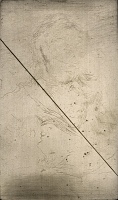Two studies of women's heads | ||
| Number: | 331 | |
| Date: | 1887/1888 | |
| Medium: | drypoint | |
| Size: | 84 x 50 mm | |
| Signed: | butterfly at lower left | |
| Inscribed: | no | |
| Set/Publication: | no | |
| No. of States: | 1 | |
| Known impressions: | 1 | |
| Catalogues: | K.-; M.-; T.-; W.- | |
| Impressions taken from this plate (1) | ||
KEYWORD
head, portrait, woman.
TITLE
Whistler's original title is not known, so descriptive titles were given to the copper plate.
'Head of a girl' (1903/1935, possibly Rosalind Birnie Philip (1873-1958)). 1
'Two studies of women's heads' (2010, Whistler Etching Project).
Miss Birnie Philip could have recorded the title 'Head of a girl' in consultation with Whistler or after his death, when the plates were organised and given to the University of Glasgow. However, it is misleading because there are actually studies of two women's heads on the plate. It is not certain that the two studies show the same woman, so the title 'Two studies of women's heads' has been chosen.
'Head of a girl' (1903/1935, possibly Rosalind Birnie Philip (1873-1958)). 1
'Two studies of women's heads' (2010, Whistler Etching Project).
Miss Birnie Philip could have recorded the title 'Head of a girl' in consultation with Whistler or after his death, when the plates were organised and given to the University of Glasgow. However, it is misleading because there are actually studies of two women's heads on the plate. It is not certain that the two studies show the same woman, so the title 'Two studies of women's heads' has been chosen.
1: Envelope containing copper plate, Hunterian Art Gallery.
DESCRIPTION
The head and shoulders of a woman in three-quarters view, looking down to the right. She has a fluffy fringe, and the rest of her hair is brushed back, fastened at the crown, and falls down the back of her head. She seems to have a broad rounded collar. The other way up, there is the head of a woman in profile to left, with wavy hair, and a bushy fringe.
SITTER
Not identified. It could be Beatrice Whistler (1857-1896) or one of Whistler's in-laws, such as Ethel Whibley (1861-1920). Alternatively it could possibly be Gertrude Elizabeth Campbell (Lady Colin Campbell) (1857-1911) (see Lady Colin Campbell 369).
DISCUSSION
It is not known if this drypoint was printed, or if and why Whistler destroyed any impressions.
